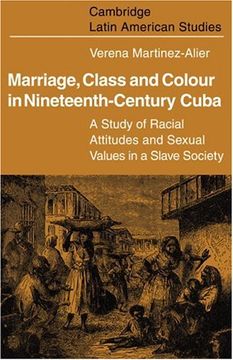Share
Marriage, Class and Colour in Nineteenth Century Cuba: A Study of Racial Attitudes and Sexual Values in a Slave Society (Cambridge Latin American Studies)
Verena Stolcke; Martinez Alier; Verena Martinez-Alier (Author)
·
Cambridge University Press
· Paperback
Marriage, Class and Colour in Nineteenth Century Cuba: A Study of Racial Attitudes and Sexual Values in a Slave Society (Cambridge Latin American Studies) - Verena Stolcke; Martinez Alier; Verena Martinez-Alier
Choose the list to add your product or create one New List
✓ Product added successfully to the Wishlist.
Go to My Wishlists
Origin: U.S.A.
(Import costs included in the price)
It will be shipped from our warehouse between
Monday, June 24 and
Wednesday, July 10.
You will receive it anywhere in United Kingdom between 1 and 3 business days after shipment.
Synopsis "Marriage, Class and Colour in Nineteenth Century Cuba: A Study of Racial Attitudes and Sexual Values in a Slave Society (Cambridge Latin American Studies)"
An analysis of marriage patterns in nineteenth-century Cuba, a society with a large black population the majority of which was held in slavery but which also included considerable numbers of freedmen. Dr Martinez-Alier uses as her main source of evidence the records in Havana of administrative and judicial proceedings of cases in which parents opposed a marriage, of cases involving elopement, and of cases of interracial marriage. Dr Martinez-Alier develops a model of the relation between sexual values and social inequality. She considers the importance of the value of virginity in supporting the hierarchy of Cuban society, based on ascription rather than achievement. As a consequence of the high evaluation of virginity, elopement was often a successful means of overcoming parental dissent to an unequal marriage. However, in cases of interracial elopement, the seduced coloured woman had little chance of redress through marriage. In this battle of the sexes and the races, the free coloured women and men played roles and acquired values which explain why matrifocality became characteristic of black free families.
- 0% (0)
- 0% (0)
- 0% (0)
- 0% (0)
- 0% (0)
All books in our catalog are Original.
The book is written in English.
The binding of this edition is Paperback.
✓ Producto agregado correctamente al carro, Ir a Pagar.

